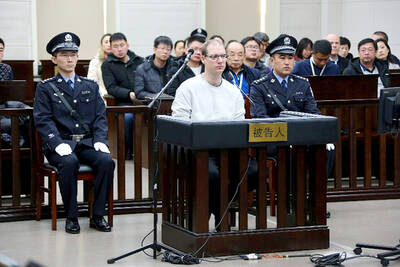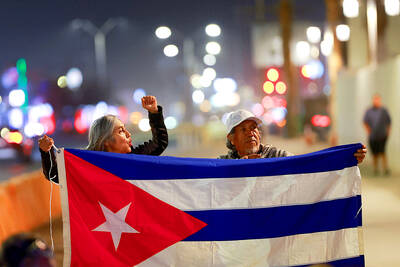A top leader of Myanmar's rebel Karen National Union (KNU) was likely killed by a professional hitman, possibly hired by a splinter group aligned with the ruling junta, a KNU spokesman said yesterday.
The spokesman said a rival group probably ordered the assassination of Pado Manh Sha to sow divisions in the already weakened rebellion which has been battling Myanmar's rulers for nearly six decades.
Two gunmen shot dead Pado Manh Sha, the KNU's secretary-general based in the Thai border town of Mae Sot, at his home on Thursday, Thai police said.
One of the most prominent figures in the KNU, he was also a critical link between the rebellion and the pro-democracy movement inside Myanmar.
KNU spokesman David Thaw said the group's leadership would gather yesterday in Mae Sot to make funeral preparations and try to unravel the mystery of his killing.
"There's a lot of confusion," he said by telephone.
"At the moment we think that it must be someone trying to create problems for the Karen, to create more disunity and divisions among each other," he said. "It might be a professional killer, so someone might have hired this gunman. It is a very cold-blooded killer who can kill Pado Manh Sha at his house."
"The gunshot was very accurate for someone to die instantly," he said.
Thai police said they were combing through Pado Manh Sha's two-story house to search for clues, but admitted they were struggling to find a solid lead.
"We are investigating to look for more evidence," a senior provincial police officer said.
A Thai military officer in Mae Sot said on condition of anonymity that investigators believe the killing was likely committed by a Karen splinter group such as the Democratic Karen Buddhist Army (DKBA).
Most Karen are Christians, but the DKBA has broken away and aligned itself with Myanmar's junta, which has ruled the country since 1962.
The KNU is the largest rebel group fighting against Myanmar's armed forces and one of the few remaining ethnic insurgencies that has yet to sign a peace deal with the junta.
The group once controlled broad swaths of eastern Myanmar but now is reduced mainly to a string of bases pressed against the Thai border.

China’s military news agency yesterday warned that Japanese militarism is infiltrating society through series such as Pokemon and Detective Conan, after recent controversies involving events at sensitive sites. In recent days, anime conventions throughout China have reportedly banned participants from dressing as characters from Pokemon or Detective Conan and prohibited sales of related products. China Military Online yesterday posted an article titled “Their schemes — beware the infiltration of Japanese militarism in culture and sports.” The article referenced recent controversies around the popular anime series Pokemon, Detective Conan and My Hero Academia, saying that “the evil influence of Japanese militarism lives on in

DIPLOMATIC THAW: The Canadian prime minister’s China visit and improved Beijing-Ottawa ties raised lawyer Zhang Dongshuo’s hopes for a positive outcome in the retrial China has overturned the death sentence of Canadian Robert Schellenberg, a Canadian official said on Friday, in a possible sign of a diplomatic thaw as Canadian Prime Minister Mark Carney seeks to boost trade ties with Beijing. Schellenberg’s lawyer, Zhang Dongshuo (張東碩), yesterday confirmed China’s Supreme People’s Court struck down the sentence. Schellenberg was detained on drug charges in 2014 before China-Canada ties nosedived following the 2018 arrest in Vancouver of Huawei chief financial officer Meng Wanzhou (孟晚舟). That arrest infuriated Beijing, which detained two Canadians — Michael Spavor and Michael Kovrig — on espionage charges that Ottawa condemned as retaliatory. In January

A sign hanging from a rusty ice-green shipping container installed by Thai forces on what they say is the border with Cambodia reads: “Cambodian citizens are strictly prohibited from entering this area.” On opposite sides of the makeshift barricade, fronted by coils of barbed wire, Cambodians lamented their lost homes and livelihoods as Thailand’s military showed off its gains. Thai forces took control of several patches of disputed land along the border during fighting last year, which could amount to several square kilometers in total. Cambodian Kim Ren said her house in Chouk Chey used to stand on what is now the Thai

NEW RULES: There would be fewer school days, four-day workweeks, and a reduction in transportation services as the country battles a crisis exacerbated by US pressure The Cuban government on Friday announced emergency measures to address a crippling energy crisis worsened by US sanctions, including the adoption of a four-day work week for state-owned companies and fuel sale restrictions. Cuban Deputy Prime Minister Oscar Perez-Oliva Fraga blamed Washington for the crisis, telling Cuban television the government would “implement a series of decisions, first and foremost to guarantee the vitality of our country and essential services, without giving up on development.” “Fuel will be used to protect essential services for the population and indispensable economic activities,” he said. Among the new measures are the reduction of the working week in